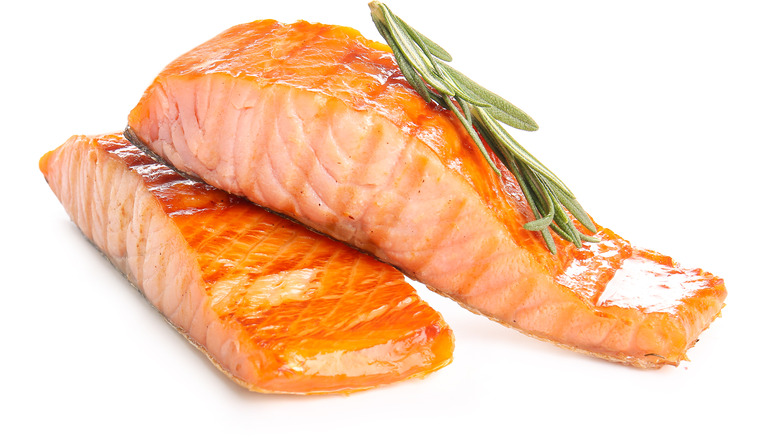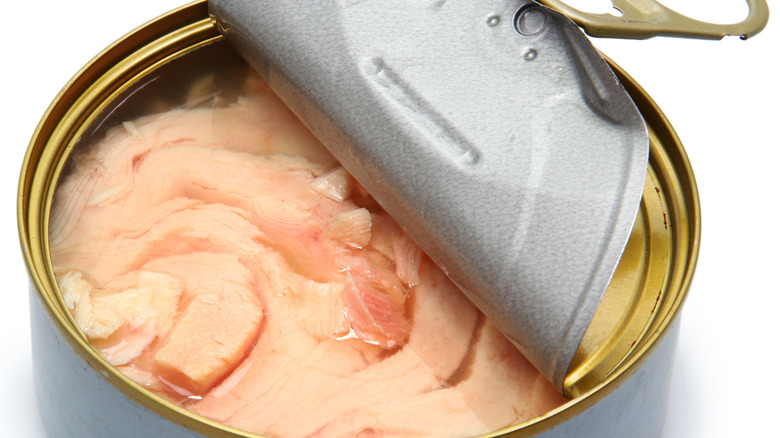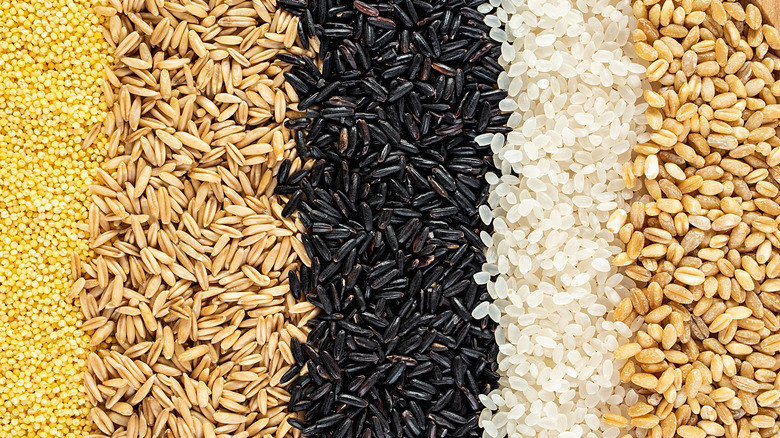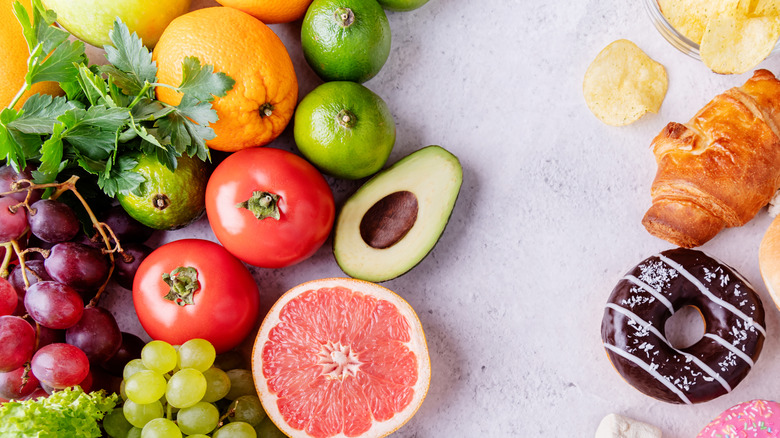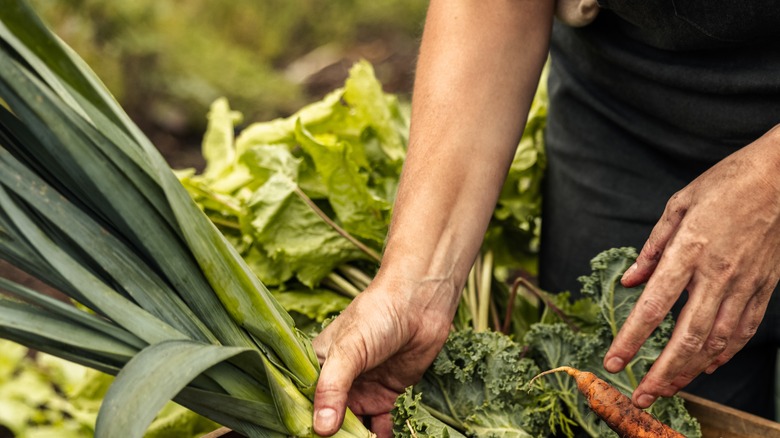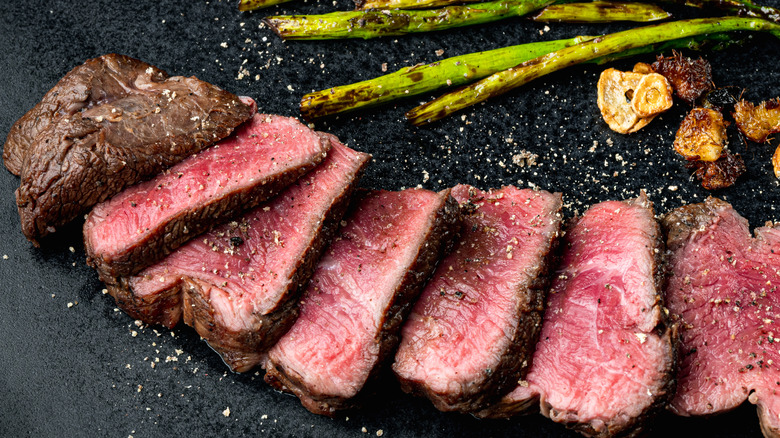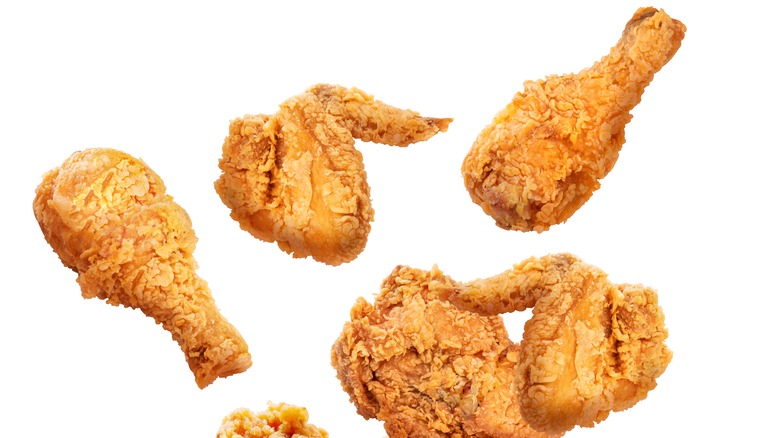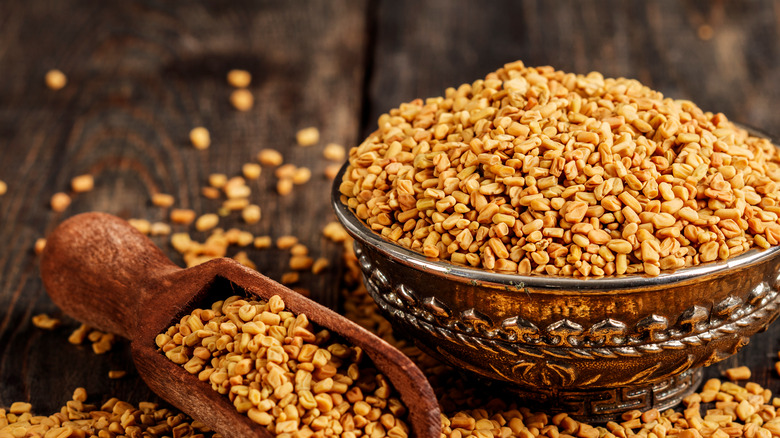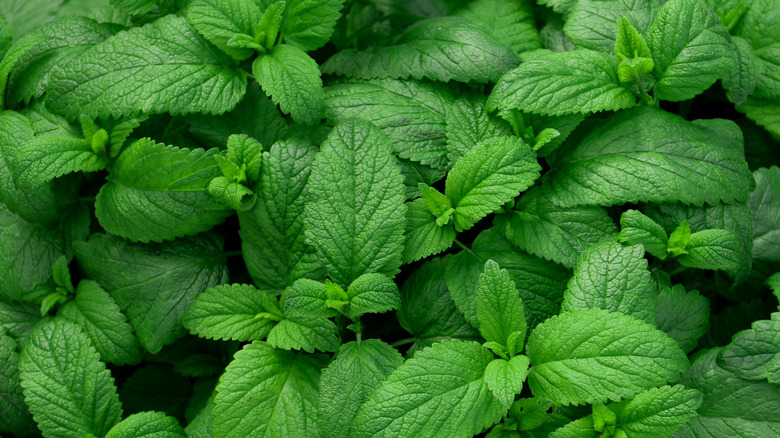6 Foods To Eat And 6 To Avoid While Breastfeeding
Breastfeeding is one of the most important times in a baby's development, and with it comes a wealth of benefits for both mother and baby. Healthline explains that breastfeeding can actually help the mother reduce the risk of developing heart disease and diabetes down the line. The site also notes that it is good for stress reduction, and can help you connect more deeply to your baby. In addition to the benefits you receive from breastfeeding, it might not come as a surprise that your baby is benefitting at the same time.
"Nourishing nutrients and protective compounds" are aplenty in breast milk, according to the site, making it the perfect fuel for your baby's development. What you consume in your daily diet has a pretty significant effect on your breast milk, so making sure your diet is in tip-top shape will ensure that your breast milk is full of the nutrients your baby needs.
Furthermore, breastfeeding can take a lot of energy, so generally making sure you're eating nutrient-dense foods to refuel your energy should also be a priority. When it comes to eating during breastfeeding, some foods are better than others, and some should be avoided at all costs. Continue reading to discover which is which.
Eat salmon
Salmon is one of the most nutrient dense foods there is. According to WebMD, salmon is loaded with protein, a bevy of vitamins, and omega-3 fatty acids, all of which are excellent for a baby's development. Certified nurse midwife Sue Hudson, CNM, spoke to the site and said, "Consuming those foods will help with the baby's nervous system development."
Verywell Family also encourages eating fish like salmon during breastfeeding, as it contains high levels of protein and is reduced in saturated fat. Furthermore, experts explain that there are certain nutrients fish has that can't be found in other food, such as iodine, vitamin D, and a specific type of omega-3 fatty acid called docosahexaenoic acid (DHA). This particular fatty acid is great for the nervous system, as previously mentioned, as well as the development of the brain and eyes.
When it comes to the nutritional value of salmon, there is a difference between farmed and fresh caught. According to Healthline, salmon that is farmed contains slightly higher levels of fat and calories than wild caught, and wild caught has more protein.
Overall, wild caught salmon contains slightly higher levels of nutrients than farmed salmon, although both generally score high in this department.
Avoid fish high in mercury
While including salmon in your diet is a positive thing for your health, there are other types of fish to avoid if you want to protect the health of you and your baby. According to Verywell Family, fish that are high in mercury should be avoided, as mercury can be passed through breast milk to the baby.
If you've ever wondered where mercury actually comes from, the site explains that it is a "naturally occurring chemical element" that is generated from the production of coal, wood, and other elements, and is typically airborne. It can settle to the ground via raindrops or in the form of dust, and can accumulate in large fish, such as "shark, king mackerel, swordfish, and tilefish," according to the site. This is because these large fish eat a lot of smaller fish which contain mercury, thus their mercury levels are higher.
Experts state that mercury is a toxic substance that negatively affects the nervous system, and can be particularly harmful during pregnancy and breastfeeding, as it can interfere with the development of the brain and nervous system of the baby. Before purchasing fish from a local area, Verywell Family suggests seeing if there are any environmental warnings in the area.
Eat whole grains
Eating whole grains is a good idea whether you are breastfeeding or not. However, they can be especially beneficial while breastfeeding as they provide many essential nutrients you'll need during this time. According to Medical News Today, nursing women should consume 8 ounces of whole grains like brown rice and whole-wheat flour a day. When choosing what type of grain to eat, it's best to avoid eating refined grains like white rice and refined flour, as they have been linked to health issues such as obesity, according to Healthline.
Whole grains, on the other hand, are linked to a decreased risk of diabetes, heart disease, and even cancer. More examples of whole grains include oatmeal, wild rice, wheat berry, barley, and quinoa.
Furthermore, some whole grains can even be a significant source of protein, which is also key during breastfeeding (via Medical News Today). The site explains that women actually need an extra 25 grams of protein a day, which amounts to approximately 65 grams in total. Incorporating whole grains into your diet is an excellent way to supplement that need. Whole grains that are high in protein include quinoa, amaranth, farro, and couscous, among others (via Verywell Fit).
Avoid processed junk food
Highly processed junk foods are on the black list for nursing mothers (as well as anyone else who might be trying to monitor their health), according to experts. Although chips, candy, and soft drinks are alluring treats, limiting your intake of these foods is the best bet for you and baby. Verywell Family explains that these foods are full of what experts call empty calories, meaning they have little to no nutritional value and are high in calories to boot. These types of calories leave you feeling hungry after only a short amount of time — this can lead to weight gain, fatigue, and diabetes, according to the site.
Furthermore, experts explain that these (however delicious) flavors can be transmitted to your breast milk, leading your baby to crave these fatty and sugary treats down the line. Swapping junk food for healthier food will help your baby crave those foods instead. If you are feeling peckish, try holding off on the junk food and eating snacks like fresh fruit, nuts, yogurt, or whole grain cereal. Keeping these items on hand at home makes it easier to make healthier choices when faced with a craving.
Drink water
It might not come as a surprise that breastfeeding can be dehydrating. According to Verywell Family, breast milk is made up of 90% water. This means that if you are consistently feeding your baby breast milk, the possibility of becoming dehydrated can be high. Experts at the site say that breastfeeding women should aim to drink 128 ounces of water a day, which is approximately 3.7 liters. This is about 1 liter more than The U.S. National Academies of Sciences, Engineering, and Medicine recommends for non-pregnant women, according to Healthline. If you're someone who has a hard time knowing whether or not you're dehydrated, Verywell Family says it's often as simple as just feeling thirsty.
Another interesting fact is that oxytocin — the hormone released during breastfeeding — sends a signal to your brain indicating thirst, triggering you to drink more water. This happens in order to make sure mothers get enough water while breastfeeding, and it also helps them generate more milk. If you happen to miss the mark for your daily water intake, some of the symptoms of dehydration include a dry mouth, constipation, fatigue, dizziness, and moodiness, according to the site. If all this water has you feeling bored, the good news is that you can meet your needs by drinking other liquids that are sugar free and caffeine free.
Avoid caffeine
While it's clear that getting enough fluids each day is crucial for the health of you and your baby, there are certain beverages during breastfeeding that are better left untouched. One category of drinks (on your list) that needs to be minimized? Caffeine. Healthline explains that caffeine is a substance that is naturally found in plants, and activates your nervous system increasing "alertness and energy levels." While it may be tempting to gulp down coffee throughout the day as a new mother, the experts suggest moderation.
The site explains that while only 1% of the caffeine you ingest actually makes it to your breast milk, that small amount can have a major effect on your baby. Because babies are not able to break down and eliminate caffeine from their systems as quickly as adults, caffeine can stay in their systems for as long as 130 hours. That compares to a maximum of seven hours for adults. This is because babies' livers and kidneys are not fully developed. If you are regularly consuming caffeine, this can lead to an accumulation of caffeine in your baby's system, which could lead to irritability and trouble sleeping.
The good news is that caffeine does not have to be completely eliminated from your diet — just reduced. The site recommends a maximum of 300 milligrams of caffeine per day, which could equal about one and a half cups of coffee, depending on the strength.
Eat an assortment of vegetables
Vegetables are a crucial part of a well-balanced diet, so it stands to reason that they would be an excellent addition to your breastfeeding diet. According to Medical News Today, women who are breastfeeding should eat approximately three cups of vegetables a day, while those who mix formula feeding with breastfeeding should aim for 2.5 cups. Some of the vegetables the site recommends are spinach, cooked leafy greens, carrots, sweet potatoes, pumpkin, and red sweet peppers among others. Experts explain that the high amount of vitamins and antioxidants found in vegetables can help replenish milk supply in nursing mothers, and generally help them maintain their health.
According to the website Parents, spinach in particular has been shown to help increase the quantity of breast milk produced due to its high quantities of iron. Iron can be especially important for new mothers who have experienced what's called postpartum hemorrhage, or who may have lost an above average amount of blood during childbirth. A study published by the journal, Birth, explains that anemia caused by low iron levels in new mothers can lead to insufficient milk production. Fennel is another vegetable that has been proven to be beneficial for both mothers and babies. The website Drugs reports that fennel has been shown to increase "milk volume, fat content and infant weight gain," in two small studies.
Avoid Alcohol
If you've heard of the term "pump and dump" before, then you may already be familiar with this "don't." This particular term refers to a nursing mother pumping her breast milk and then "dumping" it due to elevated levels of alcohol. In case you were wondering, according to the CDC, this isn't actually a myth, and alcohol can be detected at potentially unsafe levels in breast milk after a mother drinks. The site explains that alcohol levels are typically the highest half an hour to an hour after drinking, and can last anywhere from two to three hours in breast milk after that depending on how much alcohol was consumed.
If the mother consumes higher levels of alcohol, it will stay in her breast milk for longer. For example, if you consume one drink of alcohol it will stay in your breast milk for two to three hours, two drinks can be detected roughly four to five hours, and if you consume three drinks, the alcohol can stay in your system for six to eight, going up from there.
Additional factors that can affect how long alcohol stays in breast milk include your weight, how much you ate, and how fast you drank. Generally speaking, the CDC recommends staying away from alcohol, although one drink a day has not been shown to be particularly harmful to infants. If alcohol is consumed at "above moderate" levels however, this could potentially negatively affect the baby's development.
Eat lean meat
Making sure you get enough protein while you are breastfeeding is paramount to your health. Medical News Today explains that consuming protein is crucial in the development of breast milk, and the nutrition you receive from it is shared with the baby to help their development. As we mentioned above, the site explains that breastfeeding mothers need to take in an extra 25 grams of protein per day compared to non-breastfeeding women. While there are several ways to get protein, one key way is to make sure you are eating sufficient quantities of lean meat. In particular, Healthline recommends including beef, chicken, lamb, pork, and organ meats, into your diet to make sure you're hitting protein requirements.
In general, lean meat is defined as meat that has less fat than other cuts of meat, according to another Medical News Today article. When shopping for beef or pork, the site recommends searching for cuts that use the words "loin," or "round," as they have the least amount of fat. Beef sirloin, flat iron steak, or 95% lean ground beef are also great options. Other types of lean meat to consume include poultry, such as skinless chicken, turkey, or wild game.
Avoid fatty meats and fried food
It's pretty much a no brainer that fried and fatty foods in excess do not form part of a healthy diet. While getting your protein from healthy meats like poultry and lean steaks can be great for your health, there are certain cuts of meat that should be avoided. Verywell Health explains that meats that are high in sodium and saturated fats such as bacon, sausages, and hot dogs should be limited, as they don't contribute the nutrients needed during breastfeeding. According to Healthline, saturated fat is a type of fat that is solid at room temperature, and is usually found in fried food, fatty cuts of meat, and dairy products including butter. It has been linked to increases in "bad" cholesterol, and factors associated with heart disease.
In addition to the saturated fat you'll find in fatty meat or fried food, you may also find trans fat, which is another type of fat that is typically found in fried foods, and according to Healthline has no nutritional value, and has been described as unsafe to eat by the USDA. Furthermore, Verywell Health explains that the high levels of salt in cured meats like bacon can contribute to water retention, which can lead to "swelling and high blood pressure," if you overdo it.
Eat fenugreek
If you've come across some hurdles in your breastfeeding journey and are looking to boost milk production, this seemingly magical herb may help you do the trick. According to Healthline, fenugreek is an herb that is approximately two to three feet tall, and has small, white flowers. Its ground seeds are used in various cuisines like curry for its distinctive flavor, and have also garnered attention for their ability to help encourage the production of breast milk in nursing mothers. According to the site, this is not new information — the herb has been used by women for centuries for this very purpose.
One study in particular published by Breastfeeding Medicine tested fenugreek on breastfeeding women and found that when compared to a control group, mothers that were given a combination of a fenugreek, turmeric, and ginger supplement saw a 49% increase in their milk production at two weeks, and 104% by four. Although Healthline says that researchers have yet to find a definitive reason why fenugreek works so well, some evidence suggests that the phytoestrogens in the plant may work similarly to estrogen in the body to help produce milk. To get started, you can drink a tea that contains 1 teaspoon of fenugreek seeds and drink it three times a day (via Healthline). Capsule supplements are also available.
Avoid specific herbs and spices
While fenugreek has the green light when it comes to helping increase breast milk, some herbs and spices may have the opposite effect. According to Verywell Family, while most of these herbs consumed in small amounts may not cause harm, if you are heavy handed with some of these or just consume a lot over time, they can have a negative effect on lactation. Some of the herbs the site mentions are peppermint and sage, which have been shown to decrease milk production. In some cases these two herbs are even used by women in the weaning process to halt milk production completely.
If you're a fan of peppermint breath mints, candy, or regularly use menthol cough drops, experts at the site recommend nixing those as well. The site also suggests you, "Avoid large doses of parsley, oregano, jasmine, and yarrow."
Healthline points out that overall, one of the most important things to note while breastfeeding is your baby's reactions to certain foods. Some babies may not show an adverse response to certain herbs or foods, while others may show signs of distress that will make it necessary to visit your doctor. Signs that your baby might be allergic or sensitive to something in your diet may include eczema, constipation, hives, vomiting, bloody stools, diarrhea, and more.


